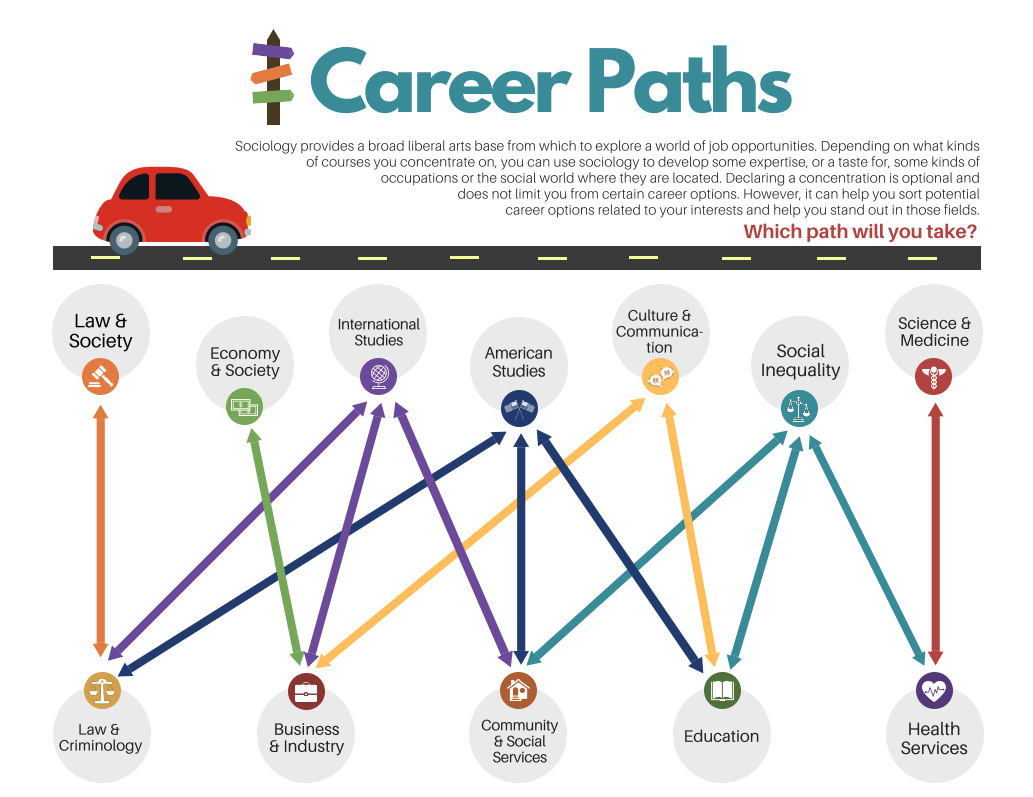What can you do with a BA in sociology from UC San Diego?

Sociology provides a broad liberal arts base from which to explore a world of job opportunities. Depending on what kinds of courses you concentrate on, you can use sociology to develop some expertise, or a taste for, some kinds of occupations or the social world where they are located.
- Sociology provides knowledge and analytical skills needed to pursue a professional degree in law, business, education, health and medicine, social work, or counseling.
- It offers preparation for fields that involve investigative skills and working with diverse people, such as journalism, politics, public relations/marketing, business, human resources or public administration.
- It provides the strong liberal arts preparation needed for positions in the criminal justice system, business, social service, and government.
- It is a first step for future graduate work in sociology in order to become a professor or researcher.
If you're like most students, you're probably wondering about the type of employment sociology majors can expect after graduation. You enjoy the major and the course of study, but will it get you a job? Rest assured, there is life after sociology at UC San Diego for sociology majors. In fact, you may be surprised to find that your broad liberal arts education gives you a wide range of career options.
One of the virtues of a major in sociology is flexibility in the job market. Actual entry-level job titles of UC San Diego sociology graduates show this diversity: operations planner for a defense firm, program assistant for a social service agency, teacher, programmer, production coordinator for a publishing firm, social worker for a large, local health agency, communications technician for a telecommunications company, sales representative, analyst, and health intake counselor.
Check UC San Diego Career Services for more information.
Check out our career paths flyer for more guidance on how you can turn your interests into possible career options!
Now that you know that opportunities exist, how do you proceed with your own career search?
Remember three crucial pieces of advice that will enhance your chances of finding meaningful employment after graduation.
- Decide what you want to do.
A clear career goal is the essential first step of any career search. It doesn't have to be a lifetime goal, just a plan of action for now. The Career Services Center has many services available to help you identify an occupation you'd like to pursue. There are workshops and information sessions focusing on specific occupational areas, computerized career guidance programs, printed resources on various occupations, videotapes, and helpful advisers who can assist you in putting all the information together.
Occupations of alumni who have been in the work force for a few years will reveal even more opportunities. Some examples are: magazine editor, contract and grants administrator, attorney, personnel manager, probation officer, career counselor, marketing director, information specialist, district attorney, and political consultant. You can speak to these alumni about their jobs and how they applied their sociology education to their career. Check the "What can I do with this major?" section of the Career Services website.
- Get practical, work-related experience.
For students who enter the job market, studies have shown that part-time practical experience during their college years is a significant factor in helping them to achieve success. Graduates who had such experience consistently show a lower unemployment rate, higher salaries, and better career potential for their jobs than those without it. Even if you decide to go on to graduate or professional school, admissions committees for advanced degrees favor candidates with such experience. In addition, practical experience can help you decide what you might like to do in the work force. By testing an occupation before committing to a full-time career, you can see if it suits you.
There are many ways you can find pre-professional employment while going to school. The Career Services Center lists on- and off-campus part-time and temporary jobs as well as paid internships and co-op positions. Other offices on campus, specifically the Academic Internship Program in the literature building, list internships as mentioned previously in this handbook. If you have ideas for developing your own internship and need assistance approaching an employer, you can discuss them with a career adviser. - As you begin your job search it is important to remember that not all methods work equally well for all types of positions.
For example, most recent UC San Diego alumni surveys show that while engineering students can best spend their job search time utilizing Career Services' job listings, attending job fairs, and participating in on-campus interviews, sociology majors and other liberal arts graduates should plan to utilize other strategies depending on their job goals. Those seeking human services-related jobs would be better served using networking and previous experience with related employers in addition to Career Services' job listings to increase their odds of a successful outcome. For more information on which strategies work best for your field of interest, check out the Career Services Center, which is there to help wherever you are in the search process. Even if you reach your senior year and haven't followed the conventional wisdom described here, it's not too late. Custom-made programs for last-minute job seekers prepare seniors, and even graduates, for employment.